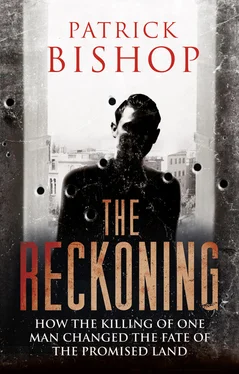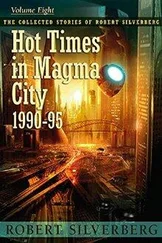They also introduced him to important figures in the Polish government. Stern’s direct manner inspired confidence and cut through red tape. ‘Matters that normally would require prolonged deliberations … were settled simply and without signatures,’ wrote Ada Amichal-Yevin. Some of the officials he came into contact with became friends, among them Witold Hulanicki, the art-loving Polish consul in Jerusalem who helped arrange passports for Betar youths bound for Palestine and overcome the obstacles that the British were always throwing up in an attempt to stem the flow of Jewish immigration. *This was a heady experience. A Jew from the provinces, not yet out of his twenties, was moving easily in the highest circles and by his skill and charm striking valuable deals with a government whose outlook was increasingly anti-Semitic. It reinforced his conviction that anything was possible and persuaded him that help for the great project could be found in the most unlikely-looking quarters. This belief would cause him great trouble later on.
There were plenty who could attest to the young Stern’s magnetism. Lily Strassman herself described her decision to follow Stern in almost mystical terms. ‘It’s difficult for me to explain that this was not a simple matter of persuasion,’ she said. ‘I wasn’t religious. But it was as if the finger of God had pointed him in the direction he had taken and to me to follow him.’ 23Many of Stern’s acolytes were to use similar language in describing their dealings with him. Consciously or otherwise, their testimony has a scriptural ring to it, with them the disciples and Stern the Christ-like teacher. By now he was thinking and behaving as someone anointed for great things, a man who could not be expected to be constrained by the normal rules of discipline or behaviour. He conducted much of his business without reference to the Irgun command in Palestine, much less to Ze’ev Jabotinsky.
The Polish connection was essential to Jabotinsky’s vision. His grand plan was to arrange a mass exodus of 40,000 young Jewish males from Poland and elsewhere to Palestine, to form the core of a liberation army to wrest Palestine from the Arabs and challenge British rule. From late 1936, Betar members started training at clandestine military camps. Stern was closely involved in the process. Initially he teamed up with the man running the early courses, a Polish Jew named Avraham Amper. Then, through his contacts, he persuaded the Polish military to provide premises and instructors for three-month programmes. From the outset he seems to have regarded this as a personal project, one that would give him a power base independent of Jabotinsky, and he did his best to keep the details from him. By early 1939, the scheme had grown to the point where the Poles were providing a rigorous military education not only for local Jews but for visitors from Palestine. One young volunteer, Yaacov Levstein, remembered a twenty-four-hour rail trip from Constanta to Kraków, from where he went to a training base in the Tatra Mountains on the border with Czechoslovakia. The instructors were ‘Polish army officers, some of them veterans of Pilsudski’s legions, some former members of the pre-World War One Polish underground, and the rest Polish army career officers’. 24The instruction was divided into underground tactics and conventional war fighting. The underground training involved ‘terrorist bombing, conspiracy, secret communications … sabotage was taught on a scientific basis. Many hours were devoted to calculating the quantities of explosives needed for destroying targets.’
The lectures were accompanied by live exercises. ‘Every day we would go out to the woods … the vicinity roared with thunderous explosions, automatic fire and gun shots … we would go out at dawn on a long hike and come back at night, tired, frozen and dirty but joyous and hopeful.’
Avraham Stern would turn up during the course or at the passing-out parade and deliver speeches that moved not only the Jews but their Polish instructors. Levstein remembered him speaking ‘to us of his plan for national liberation and explained that if we did not act expeditiously the British would implement their plan of putting our country under Arab rule and reducing the Yishuv to a ghetto they could easily control’.
Yaacov Polani, another veteran of the course from Palestine who stayed on for a while afterwards as a Betar instructor in Poland, later told his British interrogators that Stern was believed to be using the training for his own ends. The programme was supposed to provide a professional military cadre which would remain in the ranks of the Betar and come under Jabotinsky’s overall control rather than that of the Irgun. Stern, however, was ‘busy organising what he called “the reservoir” … people who would get military training and on arrival in Palestine would join the [Irgun]’. 25This manoeuvre ‘did not find favour in the eyes of the Revisionist Party and a number of people were expelled from Betar for joining Stern’s activities’. When Betar leaders appealed to Jabotinsky to urge Stern to desist ‘he got certain promises from Stern but very vague ones’.
In effect, Stern was creating the nucleus of a band of followers who could later be relied upon to carry out his plans. Some stayed on in Poland until the German invasion, then, by one means or another, made their way to Palestine where they naturally gravitated to Stern. Among them was Avraham Amper, a quiet man who followed orders unquestioningly, and Yitzhak Tselnik, who was effectively Stern’s deputy at the time of his death.
Stern’s ambition also created problems with the Irgun leadership in Palestine. Following the split in the ranks in April 1937, when half the members had returned to the Haganah, his old friend David Raziel had emerged as the commander-in-chief of the hard-line rump. During his stays in Palestine, Stern took charge of propaganda and worked with Raziel to produce a statement of the new group’s principles, the first of which was that ‘the fate of the Jewish nation will be decided by Jewish armed force on the soil of the homeland’.
Stern was loquacious and sophisticated, Raziel was taciturn and dour. They were both, though, dedicated to violent action, as Raziel had demonstrated in his response to the Arab uprising. The attacks on Arabs in Jerusalem on 14 July 1937 that signalled the end of havlagah had been followed by many more bloody reprisals. In the summer of 1938 the British hanged a young Betar member, Shlomo Ben-Yosef, for his part in an unsuccessful ambush of a bus full of Arabs near Rosh Pinna in the north of the country. Raziel ordered a wave of bombings and shootings. They were directed not at Mandate forces but at Palestinian civilians. In one attack, mounted on 6 July 1938, an Irgun man disguised as an Arab porter carried milk cans into the Haifa souk. He left them in a quiet corner and disappeared. A few minutes later they exploded, spewing fire and shrapnel into the shoppers. Twenty-three Arabs were killed. A few weeks later a similar attack in the same place killed thirty-nine. Stern had no moral objection to such outrages. By now, though, he believed that the effort was misdirected, and that the violence should be aimed at the British.
He also opposed what he saw as Raziel’s deferential attitude towards Jabotinsky. In November 1938 Jabotinsky called a meeting in Paris with the aim of merging Betar with the Irgun. Raziel went along with the plan but Stern was bitterly critical of it. He avoided an outright confrontation with Jabotinsky but let his feelings be known to Raziel. Behind his back he took soundings of Irgun members in Palestine to gauge whether they were willing to break away from the partnership with the Revisionists and reject Jabotinsky’s authority altogether. Stern’s machinations on this occasion came to nothing. It was clear, though, that further confrontations with his comrades were inevitable and that sooner or later Stern would be going his own way.
Читать дальше












